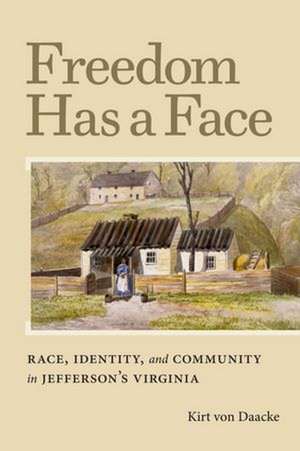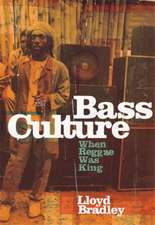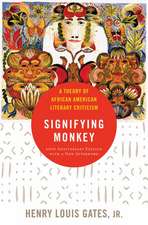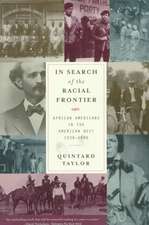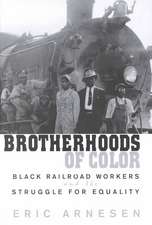Freedom Has a Face: Race, Identity, and Community in Jefferson's Virginia: Carter G. Woodson Institute
Autor Kirt Von Daackeen Limba Engleză Hardback – 29 oct 2012 – vârsta de la 22 ani
In his examination of a wide array of court papers from Albemarle County, a rural Virginia slaveholding community, Kirt von Daacke argues against the commonly held belief that southern whites saw free blacks only as a menace. Von Daacke reveals instead a more easygoing interracial social order in Albemarle County that existed for more than two generations after the Revolution stretching to the mid-nineteenth century and beyond despite fears engendered by Gabriel's Rebellion and the Haitian Revolution.
"Freedom Has a Face" tells the stories of free blacks who worked hard to carve out comfortable spaces for existence. They were denied full freedom, but they were neither slaves without masters nor anomalies in a society that had room only for black slaves and free white citizens. A typical rural Piedmont county, Albemarle was not a racial utopia. Rather, it was a tight-knit community in which face-to-face interactions determined social status and reputation. A steep social hierarchy allowed substantial inequalities to persist, but it was nonetheless an intimately interracial society. Free African Americans who maintained personal connections with white neighbors and who participated openly in local society were perceived as far more than stereotypical dangerous blacks.
Based on his work building a cross-referenced database containing individual records for nearly five thousand documents, von Daacke reveals a detailed picture of daily life in Albemarle County. With this reinsertion of individual free blacks into the neighborhood, community, and county, he exposes a different, more complicated image of the lives of free people of color."
Preț: 448.76 lei
Nou
85.87€ • 89.66$ • 70.91£
Carte disponibilă
Livrare economică 25 martie-08 aprilie
Specificații
ISBN-10: 0813933099
Pagini: 269
Dimensiuni: 152 x 229 x 25 mm
Greutate: 0.54 kg
Editura: University of Virginia Press
Seria Carter G. Woodson Institute
Recenzii
A riveting, unsurpassed portrait of the tangled lives of individual free people of color, slaves, and whites in Jefferson's Virginia neighborhood during the post-Revolutionary decades. Drawn from unprecedented, exhaustive, and path-breaking research in records that lay ignored and undeciphered, "Freedom Has a Face "traces--much like a Dickens novel--the startling connections among obscure people who, in the aggregate, reveal a world all too real but seldom appreciated by modern scholars. Kirt von Daacke implicitly cautions scholars to be wary of beloved analytical categories that do not respect the fascinating and bedeviling complexity of human beings. In all, a triumph of the historian's craft.--Michael Johnson, Johns Hopkins University
Notă biografică
Descriere
"Freedom Has a Face" tells the stories of free blacks who worked hard to carve out comfortable spaces for existence. They were denied full freedom, but they were neither slaves without masters nor anomalies in a society that had room only for black slaves and free white citizens. A typical rural Piedmont county, Albemarle was not a racial utopia. Rather, it was a tight-knit community in which face-to-face interactions determined social status and reputation. A steep social hierarchy allowed substantial inequalities to persist, but it was nonetheless an intimately interracial society. Free African Americans who maintained personal connections with white neighbors and who participated openly in local society were perceived as far more than stereotypical dangerous blacks.
Based on his work building a cross-referenced database containing individual records for nearly five thousand documents, von Daacke reveals a detailed picture of daily life in Albemarle County. With this reinsertion of individual free blacks into the neighborhood, community, and county, he exposes a different, more complicated image of the lives of free people of color.
